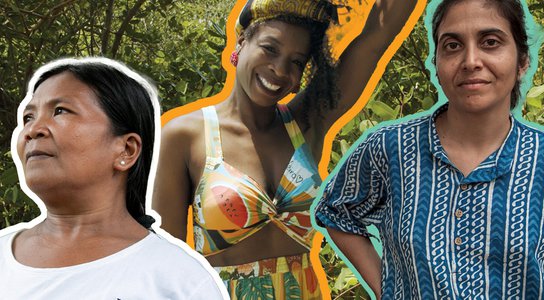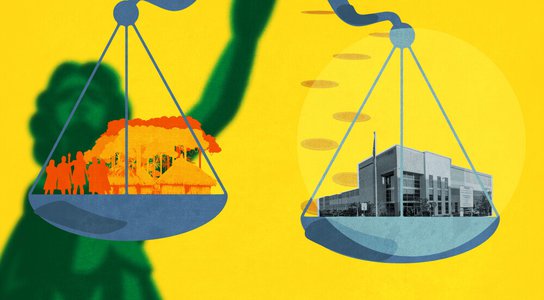“Now we’re hearing they want to plant 1,000 more hectares of oil palms. But I don’t know where they’re going to plant them, because we’re here. They’ll first need to remove us from this land,” Hernán Bedoya told filmmakers in 2016, sitting on his front porch in Colombia’s Choco region.
The following year he was murdered in broad daylight, when two masked gunmen on a motorbike sprayed him with 13 bullets.
Hernán’s son Ramón is now following in his father’s footsteps in guarding his family’s land against encroaching palm oil and banana plantations and their guns-for-hire. “It was the paramilitaries who killed him,” Ramón told us, “paid for by the businessmen.”
Companies around the
world are profiting from the murder of land defenders like Hernán, and not just
locally. The year he was assassinated, Colombia exported bananas worth US$ 909
million (€764 million) to Europe alone, along with palm oil worth US$ 247
million (€207 million). The products that line our supermarket shelves all have
a past, and sometimes it’s a bloody one.
Refusing to surrender your land to the companies that want it is an increasingly deadly pursuit. On average four people were killed every week in 2019 for taking a stand against industries like mining, agribusiness and logging that take away communities’ land and wreak havoc on the environment. Colombia was the deadliest country of all, with at least 64 land and environmental defenders killed.
These companies almost always get away with it. It’s rare that anyone is arrested or brought to court for killing defenders, and when they are it’s usually the trigger-men - the ones holding the guns, not those who paid them.
Hundreds of miles from Ramón’s home, in the European Union’s capital Brussels, lawmakers are debating what can be done to change this. In a ground-breaking new development, the European Commission has said it will propose new laws this year aimed at ensuring that companies stop harming people and the planet, and are held to account when they do.
The ramifications could be huge. Multinational companies currently enjoy unprecedented wealth, power and privilege, and many are abusing that power at immense human and environmental cost. Just 20 corporations are responsible for more than a third of global greenhouse gas emissions, for example. While coal plants and gas pipelines continue to belt carbon into our atmosphere, cattle ranchers, loggers and big agri farmers are obliterating CO2-absorbing rainforests that are one of our best weapons against climate change.
Left to their own devices, these industries are making a fortune squeezing the last fossil fuels and minerals out of our planet, while polluting the air, soil and water we all need to survive. Some are even killing those who stand in their way.
Our legal systems are
pitifully inadequate to stop this - practically speaking governments
and citizens have no real legal means to hold corporations
accountable for their human rights and environmental abuses. In many cases,
corporations’ power now exceeds that of nation states.
As whole cities prepare to be washed away by rising sea levels, extreme temperatures continue to drive communities off their land, and year-on-year the death toll of land and environmental defenders increases, an international corporate accountability regime has never been more urgent.
Now you can have your say on how to ensure businesses can be held to account for their actions. The European Union has just launched a public consultation that will form the basis of new laws on corporate accountability and due diligence that are currently being debated in Brussels.
We have a long journey ahead of us to get in place legislation that is strong enough to make a difference, but every voice counts. If you’d like to support our demands of the EU you can do so here. We’re calling for EU laws that protect land and environment defenders, ensure justice for the victims of corporate abuse, and don’t let any companies off the hook by applying these laws all the way along supply chains.
Back in Colombia, Ramón’s family are still being threatened.
“If we could get our land back, there wouldn’t be any more threats,” he told
us. Ramón’s
story of brave but dangerous resistance may have looked very different if he
was on more equal footing legally with the businesspeople who ordered his
father dead. We owe it to Ramón and the many thousands of land and environmental defenders around
the world to fight for that.
Preview image credit: Thom Pierce / Guardian / Global Witness / UN Environment


